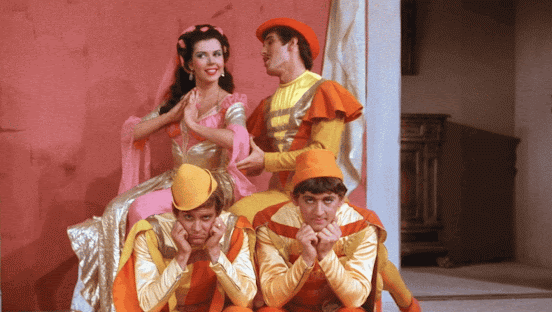Carry On... #Flower Children
Our films over the last few weeks have essentially been Boomers: The Early Years, and have explored the Boomer generation as it came of age, much to the bewilderment (at best) of the establishment.
The 1950s was surely an exasperating decade for anyone who had memories of pre-war society, and films like Beat Girl and Violent Playground (not to mention American films like Rebel Without a Cause) are a reflection of that exasperation.
But the 1950s was just the overture. It was in the 1960s that the curtain really went up on the Boomer generation.
It has become axiomatic for the Millennials and Generation Z to ask (repeatedly) what the Boomers ever did for them, and one can certainly understand the reasons for their outrage. The Boomers after all, have contributed very little to society in the decades during which they were dominant - apart from the Civil Rights movement. Also the Women's Rights movement and the sexual revolution, as well as the LGBT movement, but otherwise, the Boomers have done very little.
Ironically, the Boomers themselves should be the first ones to understand the malice of the younger generations. In the 1960s, young Boomers felt exactly the same way toward their elders.
In 1964, hippie activist Jack Weinberg coined the phrase Don't trust anyone over 30; just in case the growing chasm between generations wasn't yet stark enough. Throughout the 1960s, the Flower Children (as they were known) came to be emblematic of the Boomer rebellion against establishment society and everything the older generation represented.
Cactus Flower is a very unusual film of the Flower-Child era. Based on a hit Broadway play (which was in turn based on a French play) it tells the story of a successful 5th Avenue dentist (Walter Matthau, in his third and final appearance in this film series of ours) who has been dating Goldie Hawn, a young, kooky Greenwich Village hipster.
There is no question that Cactus Flower gleefully explores the clash of generations that was in full (ahem) swing in the late 1960s. Matthau and Hawn represent two very different generations (there is a 25 year age gap between them) but the film doesn't take sides and, crucially, doesn't have any of the moral judgement of films like Beat Girl or Violent Playground.
What it does have is a very sharp and witty screenplay by veteran writer I. A. L. Diamond.
I. A. L. Diamond is chiefly remembered for his long-time collaboration with film-making giant Billy Wilder. Diamond's name appears on the screenplays of films such as The Apartment, Some Like it Hot and One, Two, Three amongst many others, and in Cactus Flower he turns the "Swinging 60s" into the setting for a very smart and exquisitely constructed screwball comedy.
Goldie Hawn won an Oscar for her performance in this film (which is officially her big-screen debut) but for many (myself included) the stand-out performance of the film is Ingrid Bergman, playing Matthau's long-suffering nurse.
Bergman was of course a leading lady and glamour goddess throughout the 1940s, headlining such classic films as Casablanca, Spellbound and Intermezzo.
By 1969 she was in her mid-50s and was semi-retired from Hollywood. She had married Italian director Roberto Rossellini and was increasingly gravitating toward European cinema. To American audiences of the time she would have represented a bygone era of film-making, and a radically different word-view compared to the flower-power hipster child Goldie Hawn.
Goldie Hawn and Ingrid Bergman on screen together would have been more shocking in its way than Goldie Hawn and Walter Matthau.
Like all well-constructed screwball comedies, Cactus Flower presents a series of plot turns that are perfectly plausible when considered individually, but which add up to a completely bonkers (and very funny) whole.
Impressively, it manages to dissect the generation gap without being sanctimonious. It plays with the clash of values and the rapidly evolving culture without turning it into a freak show.
And the "flower-child" of the film is not necessarily who you think it is...
We will screen Cactus Flower at 7.30 on Thursday, the 23rd of November at the Victoria Park Baptist Church.

















Comments
Post a Comment